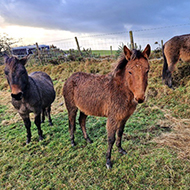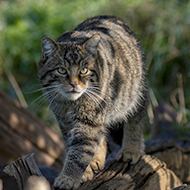Tolerant macaques have better self-control, study finds
Research provides clues about human social evolution.
Socially tolerant species of macaque are better at controlling their impulses and are less reactive, a new study has found.
Led by a team from the University of Portsmouth, the researchers used a series of touchscreen tasks to assess how impulsive and reactive monkeys were from three species of macaque: Tonkean, long-tailed and rhesus.
They found that Tonkean macaques, which are known to have more diverse and complex relationships in their social groups, showed better self-control than the less-tolerant long-tailed and rhesus species.
The researchers tested the impulse control of 66 monkeys with three different tasks.
In the distraction task, the subject had to touch a rectangular red target to receive a reward of dry raisins. For some of the monkeys, the target was displayed at the same time as a pictorial distractor, which was either a neutral face or a threatening face.
In the impulse control task, subjects were rewarded when they touched a rectangular red ‘Go’ button and when they refrained from touching a circular green ‘No-go’ button.
Subjects were also given a similar reversal learning task. The meaning of the buttons was swapped so that the circular green button led to a reward and the rectangular red one did not. Both buttons appeared on screen at the same time and the subject had to select the right one.
The results revealed that higher social tolerance was associated with better self-control, with tolerant species responding less impulsively and becoming distracted less often.
Dr Louise Loyant, lead author of the study, said: “This relationship between social tolerance and cognitive abilities could explain why Tonkean macaques are better at managing complex relationships with others.
“This is important, as it improves our understanding of our own social evolution. Macaques live in complex communities, not too dissimilar from our own, and we can learn a lot from them.
“Existing research on human inhibitory control, or self-control, suggests the better a person is at managing their emotions and reactions, the more successful they’re likely to be in life; whether that be in relationships, work, or just generally. Our results support this hypothesis.”
The researchers added that the differences in self-control could be linked to environmental factors. In their natural habitats, Tonkean macaques face a lower risk from predators than long-tailed and rhesus macaques.
Senior co-author Dr Marine Joly said: “A macaque living in a more competitive environment would benefit from learning how to contain inappropriate behaviours, like feeding or mating, if they’re around others higher up in the social pyramid.
“But there’s also the hypothesis that our closest primate species have evolved over time to have increased brain size and higher cognitive performances, including better self-control.
“Our findings support both of these potential explanations, as well as suggest that species living in more complex societies might have better socio-cognitive skills too, including perception, attention, memory and action planning.”
The study, ‘Tolerant macaque species are less impulsive and reactive’, has been published in Animal Cognition.






 The Federation of Independent Veterinary practices (FIVP) has announced a third season of its podcast, Practice Matters.
The Federation of Independent Veterinary practices (FIVP) has announced a third season of its podcast, Practice Matters.
